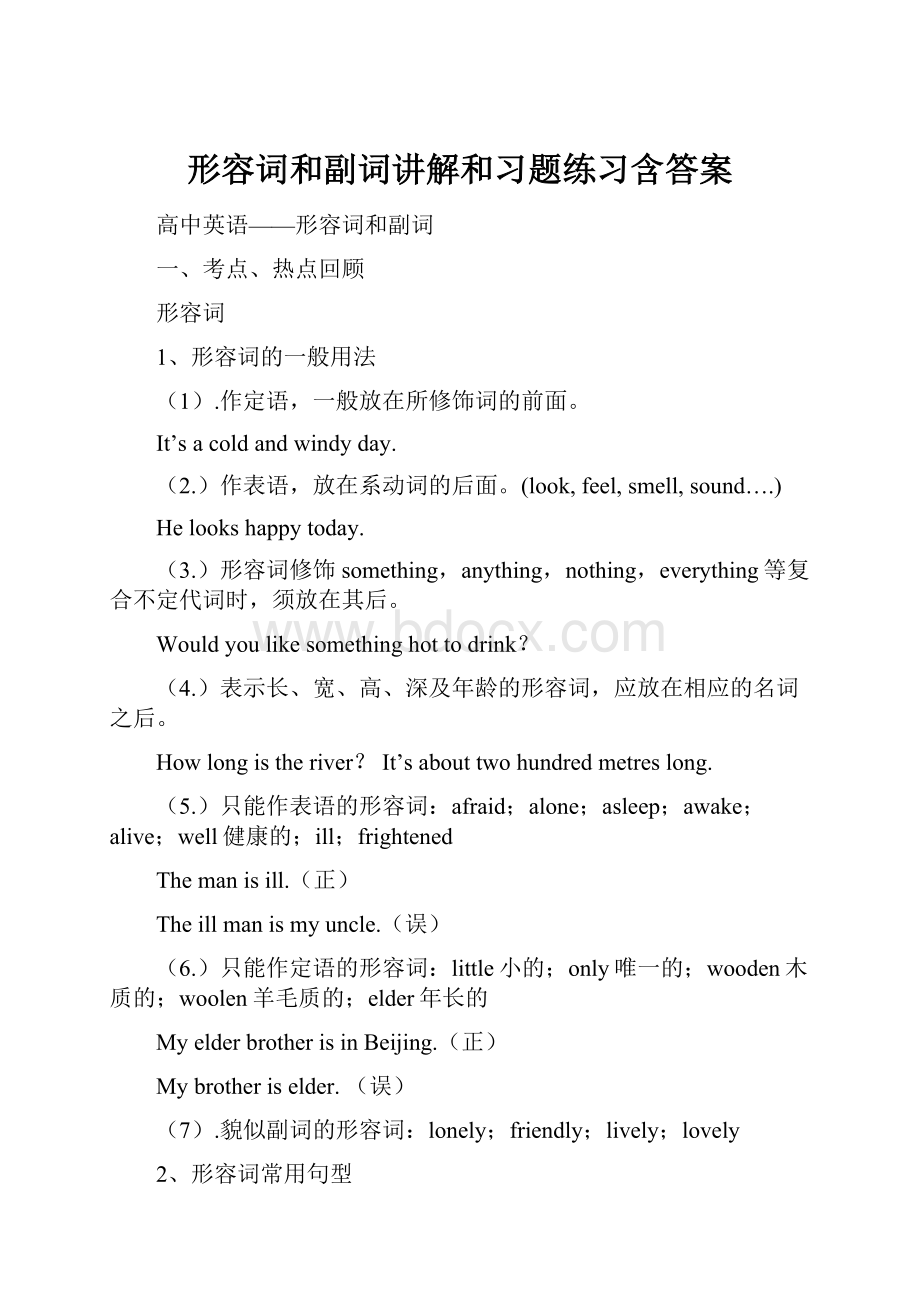 形容词和副词讲解和习题练习含答案.docx
形容词和副词讲解和习题练习含答案.docx
- 文档编号:25150313
- 上传时间:2023-06-05
- 格式:DOCX
- 页数:15
- 大小:22.37KB
形容词和副词讲解和习题练习含答案.docx
《形容词和副词讲解和习题练习含答案.docx》由会员分享,可在线阅读,更多相关《形容词和副词讲解和习题练习含答案.docx(15页珍藏版)》请在冰豆网上搜索。

形容词和副词讲解和习题练习含答案
高中英语——形容词和副词
一、考点、热点回顾
形容词
1、形容词的一般用法
(1).作定语,一般放在所修饰词的前面。
It’sacoldandwindyday.
(2.)作表语,放在系动词的后面。
(look,feel,smell,sound….)
Helookshappytoday.
(3.)形容词修饰something,anything,nothing,everything等复合不定代词时,须放在其后。
Wouldyoulikesomethinghottodrink?
(4.)表示长、宽、高、深及年龄的形容词,应放在相应的名词之后。
Howlongistheriver?
It’sabouttwohundredmetreslong.
(5.)只能作表语的形容词:
afraid;alone;asleep;awake;alive;well健康的;ill;frightened
Themanisill.(正)
Theillmanismyuncle.(误)
(6.)只能作定语的形容词:
little小的;only唯一的;wooden木质的;woolen羊毛质的;elder年长的
MyelderbrotherisinBeijing.(正)
Mybrotheriselder.(误)
(7).貌似副词的形容词:
lonely;friendly;lively;lovely
2、形容词常用句型
(1).“It’s+adj.+of+sb.+不定式”表示“某人(做某事)怎么样”。
=Sb+be+adj+todosth
注意:
这一句型中常用描述行为者的性格、品质的形容词,如good,kind,nice,polite,clever,foolish,lazy,careful,careless,right(正确的),wrong等。
It’sverykindofyoutohelpme.(=Youareverykindtohelpme.)
(2).“It’s+adj.+for+sb.+不定式”表示“做某事对某人来说怎么样”。
=Todosthisadjforsb.
注意:
这一句型中常用的形容词有important,necessary,difficult,easy,hard,dangerous,safe,useful,pleasant,interesting,impossible等。
It’snoteasyforthemtolearnaforeignlanguage.(=Tolearnaforeignlanguageisnoteasyforthem.)
(3).表示感情或情绪的形容词,如glad,pleased,sad,thankful等常接不定式。
I’mverysadtohearthebadnews.
(4.)表示能力和意志的形容词,如ready(乐意的,有准备的),able(有能力的),sure(一定),certain(一定)等常接不定式。
LeiFengisalwaysreadytohelpothers.
Heissuretogettoschoolontime.
副词
1、副词的分类
副词按词汇意义可分为:
方式副词:
well,fast,slowly,carefully,quickly
程度副词:
very,much,enough,almost,rather,quite
地点副词:
here,there,out,somewhere,abroad,home
时间副词:
today,early,soon,now,then,recently,still
频度副词:
always,often,usually,sometimes,seldom,never
否定副词:
no,not,neither,nor
疑问副词:
where,how,why
其他:
also,too,only
2、副词的基本用法:
(1).副词是用来修饰形容词、其他副词,一般放在被修饰词之前.
Heplaysthepianoverywell.
(2).副词是用来修饰动词,常放在动词之后.
Hegotupquickly
(3).enough修饰adj/adv时,放在其后.
Heisoldenoughtogotoschool.
3、常见副词用法辨析
(1).already与yet的区别
already用于肯定句句中,表示“已经”;yet用于否定句句末,表示“还”,用于疑问句句末,表示“已经”
Hehad_____leftwhenIcalled.
Haveyoufoundyourruler______?
(2)very,much和verymuch.的区别
very用于修饰形容词或副词的原级;much用于修饰形容词或副词的比较级;修饰动词要用verymuch.
Johnis____honest.
Thisgardenis_____biggerthanthatone.
Thankyou_____.
(3.)so与such的区别
1)so修饰形容词或副词;such修饰名词,MybrotherrunssofastthatIcan’tfollowhim.
Heissuchaboy.
2)so+形容词+a/an+可数名词单数
such+a/an+形容词+可数名词单数
such+形容词+可数名词复数/不可数名词
Heis___cleveraboy.=Heis____acleverboy.
Itis____coldweather.
Theyare_____goodstudents.
3)名词前有many,much,few,little(少量的)用so不用such.(多多少少仍用so)
但little表示“小的”用such.
Thereare___littlesheeponthehill.
(4).also,too,aswell与either的区别
also,aswell,too,用于肯定句,also常用于be动词,情态动词,助动词之后,行为动词之前;aswell,too用于句末;either用于否定句中,置于句末。
例如,Myfatherisateacher.Mymotheris____ateacher.
=Myfatherisateacher.Mymotherisateacher______.
=Myfatherisateacher.Mymotherisateacher,_____.
Ican’tspeakFrench……Jennycan’tspeakFrench,_____.
(5).sometime,sometimes,sometime与sometimes的区别
sometime:
表示将来的或过去的某一个不确定的时间。
sometimes:
有时,不时的=attimes
sometime:
一段时间
sometimes:
几次,几倍
We’llhaveatest______nextmonth.
_____wearebusyandsometimeswearenot.
HestayedinBeijingfor_____lastyear.
IhavebeentoBeijing______.
(6).ago与before的区别
ago表示以现在为起点的“以前”,常与一般过去时连用,不可以单独使用。
before指过去或将来的某时刻“以前”,也可泛指以前,常和完成时连用,可以单独使用。
Isawhimtenminutes_______.
Hetoldmethathehadseenthefilm______.
(7).now,just与justnow的区别
now:
与一般现在时、现在进行时、现在完成时连用,意为“现在”
just:
与现在完成时连用,表示“刚……”
justnow:
和过去时连用,表示“刚才”
Wheredoeshelive______?
Wehave_______seenthefilm.
Hewashere______.
(8).lonely/alone的区别
1).alone独自一人/没有同伴,既可作adj也可作adv.
2).lonely表示孤独,寂寞,也可修饰地点,表示荒凉,偏僻的,常与feel连用。
3).alone只作表语(以a开头的形容词一般只作表语,不作定语)而lonely既可作表语,也可作定语)
Helives_____ona_____island.
Heis_____,buthedoesn’tfeel______.
(9).fast/quickly/soon的区别.
fast表示速度之快quickly表示动作之快soon表示时间之快
I’mleavinghomethisafternoon.ReallyWhyso______
A.fastB.soonC.quicklyD.early
形容词,副词的比较级、最高级
1、规则变化
(1).一般在词尾直接加er或est,tall-taller-tallest,long-longer-longest
(2.)以不发音的字母e结尾的单词在词尾直接加r或st,nice-nicer-nicest
(3).以辅音字母+y结尾的词,把y变为i,再加er或est,heavy-heavier-heaviest
(4).重读闭音节,末尾只有一个辅音字母,双写这个辅音字母,再加er或est,big-bigger-biggest
注:
大,红,湿,热,悲,瘦,胖.双写末辅再变级.(big/red/wet/hot/sad/thin/fat)
(5).部分双音节词和多音节词分别在原级前加more构成比较级和most构成最高级,beautiful-morebeautiful-mostbeautiful
注:
表示否定意义在其前加less/least
important----lessimportant----leastimportant
EnglishismoreinterestingthanChinese=ChineseislessinterestingthanEnglish.
(6.)由“形容词+ly”构成的副词,在其前加more/most
slowly---moreslowly----mostslowly;但early—earlier---earliest
2、不规则变化
原级
比较级
最高级
good/well
better
best
many/much
more
most
little
less
least
old
old/elder
old/eldest
bad/badly/ill
worse
worst
far
farther(距离)/further(程度)
farthest/furthest
下列单、双音节词只能加more和most
原级
比较级
最高级
like(想似的)
morelike
mostlike
real(真的)
morereal
mostreal
tired
moretired
mosttired
pleased
morepleased
mostpleased
often
moreoften
mostoften
注:
形容词,副词同形有:
back,high,well,fast,early,late,straight
3.形容词,副词等级的用法
(1)、原级的用法
1).只能修饰原级的词,very,quite,so,too
Heistootiredtowalkon.
MybrotherrunssofastthatIcan’tfollowhim.
2.)原级常用的句型结构
A=B-----A+as+adj/adv的原级+as+B
表示“A和B一样”
TomisasoldasKate.
TomrunsasfastasMike.
A<B---A+not+as/so+形容词原级+as+B表示“A不如B…”
Thisroomisnotas/sobigasthatone.
Hedoesn’twalkasslowlyasyou.
4、比较级的用法
(1).可以修饰比较级的词.
much,alot,far,…的多alittle,abit,…一点儿even甚至,still仍然
LessonOneismucheasierthanLessonTwo.Tomlooksevenyoungerthanbefore.
(2.)比较级常用的句型结构
“甲+形容词/副词的比较级+than+乙”表示“甲比乙…”
TomistallerthanKate.
Igotupearlierthanmymotherthismorning.
5.最高级的用法
1).结构:
the+最高级+of+人或物(in+地点)
Heisthetallestofalltheboys
Heworkshardestinhisclass.
注:
副词的最高级前the可省掉
2).the+序数词+形容词的最高级+单数名词
TheYellowRiveristhesecondlongestriverinChina.
3).oneof+the+形容词的最高级+复数名词
Heisoneoftheclevereststudentsinourclass.
4).“特殊疑问词+be+the+最高级+甲,乙,or丙?
”用于三者以上的比较。
Whichseasondoyoulike(the)best,spring,summerorautumn?
6.级别的转换
1).原级与比较级的转换
a).倍数+as…as→(倍数-1)+比较级+than
Thisroomisfivetimesasbigasthatone=Thisroomis______biggerthanthatone.
b).notas…as与比较级的转换
A+notas…as+B→A+比较级(反义词的比较级)+than+B→B+比较级+than+A
MaryisnotasoldasTom.=Maryis__________Tom.
=Tomis_________Mary.
Thisbookisnotasexpensiveasthatone=Thisbookis__________thanthatone=Thatbookis___________thanthisone.
2).比较级与最高级的转换
a).the+最高级+of/in……
b).比较级+than+anyother+单数名词
+theother+复数名词
+anyoneelse
+anyoftheother+复名
c).Nobodyelse+比较级+than……
Tomisthetallestboyinourclass.
Tomistallerthan________boyinourclass.
Tomistallerthan_________inourclass.
__________istallerthanTominourclass.
7.级别的惯用法
(1).“比较级+and+比较级”表示“越来越……”。
Heisgettingtallerandtaller.
(2.)“the+比较级,the+比较级”表示“越……,越……”。
Themorecarefulyouare,thefewermistakesyou’llmake.
(3).“甲+be+the+形容词比较级+ofthetwo+……”表示“甲是两者中较……的”。
(ofthetwins/parents…)
Lookatthetwoboys.
Mybrotheristhetallerofthetwo.
(4).当adj的最高级前有物主代词,名词所有格,指示代词时,不用the.
Thisismybestbookofall.
(5).相比较的前后两部分必须是同类比较.
Mypencilislongerthan______(you).
(6).比较时不能与自身相比
注:
当相比较的两者属于同一范围/类别时,为了与自身相比较,要用anyother+单数名词.若两者不属于同一范围/类别时,不必用other,直接用any+单数名词.
Heistallerthan_____boyinhisclass.
Heistallerthan_____boyinourclass.
A.anyB.anyother
(7).有些含有比较级的句子里,常用that(单数、不可数名词)、those(复数名词)代替前面提到的词,以避免重复。
TheweatherinBeijingiscolderthan____inGuangzhouinwinter.
Theboysinourclassaremorethan_____inyourclass.
二、典型例题
()1.–Ifyoudon’tliketheredcoat,howaboutthegreenone
–OK,butdoyouhave_______sizeingreenThisoneisabitsmallforme.
A.abigB.abiggerC.thebigD.thebigger
()2.–Mum,IthinkI’m_______togetbacktoschool.
–Notreally,mydear.You’dbetterstayathomeforanotherdayortwo.
A.sowellB.sogoodC.wellenoughD.goodenough
()3.–Whatdeliciouscakes!
–Theywouldtaste_______withbutter.
A.goodB.betterC.badD.worse
()4.–Mr.Zhou,ofallthestudentsinourgroup,wholives_______
–IthinkLiLeidoes.
A.farB.fartherC.farthestD.thefarther
()5.Withahistoryofmorethan1,400years,ZhaoZhouBridgeisthe_______stonearch
bridgeintheworld.
A.oldB.olderC.oldestD.elder
()6.Bobneverdoeshimhomework_______Mary.Hemakeslotsofmistakes.
A.socarefulasB.ascarefullyasC.carefullyasD.ascarefulas
()7.A:
HowcanIspeakEnglish_______you
B:
You’dbetterspeakmore,Ithink.
A.asgoodasB.morethanC.aswellasD.asmuchas
()8.YourEnglishisgood.I’lltrymybesttospeakitas_______youdo.
A.clearlyasB.clearasC.clearerthanD.moreclearly
()9.–Isyourmotherbadlyill
–No,_______,onlyalittlecold.
A.seriousanythingB.seriousnothing
C.nothingseriousD.anythingserious
()10.I’mnotsureifI’mgoingtoTim’sparty;Imaygototheconcert_______.
A.onlyB.insteadC.earlyD.late
()11.Althoughtheyarebrothers,theyarethe_______oppositeofoneanother.
A.veryB.justC.fewD.little
()12.ThenewBrightRestaurantis_______thantheoldone.Mooreandmorepeople
liketoeatthere.
A.goodB.betterC.badD.worse
()13.WangPingdoes_______inphysicsthatImissedthefirstclass.
A.badlyB.MostbadlyC.worseD.worst
()14.Igotupso_______thismorningthatImissedthefirstclass.
A.earlyB.lateC.quietlyD.neatly
()15.–Doyouenjoytravelingbyplane
–No.It’s_______expensive.
A.muchmoreB.moremuchC.too
- 配套讲稿:
如PPT文件的首页显示word图标,表示该PPT已包含配套word讲稿。双击word图标可打开word文档。
- 特殊限制:
部分文档作品中含有的国旗、国徽等图片,仅作为作品整体效果示例展示,禁止商用。设计者仅对作品中独创性部分享有著作权。
- 关 键 词:
- 形容词 副词 讲解 习题 练习 答案
 冰豆网所有资源均是用户自行上传分享,仅供网友学习交流,未经上传用户书面授权,请勿作他用。
冰豆网所有资源均是用户自行上传分享,仅供网友学习交流,未经上传用户书面授权,请勿作他用。


 《初级会计实务》试题题库大全及答案详解.docx
《初级会计实务》试题题库大全及答案详解.docx
